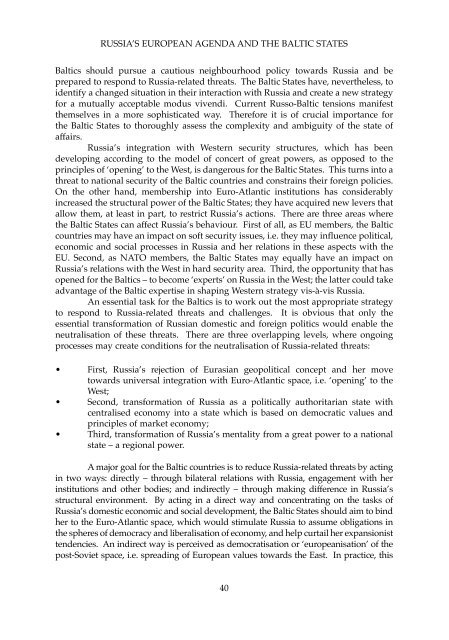Russia's European Agenda and The Baltic States - Defence ...
Russia's European Agenda and The Baltic States - Defence ...
Russia's European Agenda and The Baltic States - Defence ...
Create successful ePaper yourself
Turn your PDF publications into a flip-book with our unique Google optimized e-Paper software.
RUSSIA’S EUROPEAN AGENDA AND THE BALTIC STATES<br />
<strong>Baltic</strong>s should pursue a cautious neighbourhood policy towards Russia <strong>and</strong> be<br />
prepared to respond to Russia-related threats. <strong>The</strong> <strong>Baltic</strong> <strong>States</strong> have, nevertheless, to<br />
identify a changed situation in their interaction with Russia <strong>and</strong> create a new strategy<br />
for a mutually acceptable modus vivendi. Current Russo-<strong>Baltic</strong> tensions manifest<br />
themselves in a more sophisticated way. <strong>The</strong>refore it is of crucial importance for<br />
the <strong>Baltic</strong> <strong>States</strong> to thoroughly assess the complexity <strong>and</strong> ambiguity of the state of<br />
affairs.<br />
Russia’s integration with Western security structures, which has been<br />
developing according to the model of concert of great powers, as opposed to the<br />
principles of ‘opening’ to the West, is dangerous for the <strong>Baltic</strong> <strong>States</strong>. This turns into a<br />
threat to national security of the <strong>Baltic</strong> countries <strong>and</strong> constrains their foreign policies.<br />
On the other h<strong>and</strong>, membership into Euro-Atlantic institutions has considerably<br />
increased the structural power of the <strong>Baltic</strong> <strong>States</strong>; they have acquired new levers that<br />
allow them, at least in part, to restrict Russia’s actions. <strong>The</strong>re are three areas where<br />
the <strong>Baltic</strong> <strong>States</strong> can affect Russia’s behaviour. First of all, as EU members, the <strong>Baltic</strong><br />
countries may have an impact on soft security issues, i.e. they may influence political,<br />
economic <strong>and</strong> social processes in Russia <strong>and</strong> her relations in these aspects with the<br />
EU. Second, as NATO members, the <strong>Baltic</strong> <strong>States</strong> may equally have an impact on<br />
Russia’s relations with the West in hard security area. Third, the opportunity that has<br />
opened for the <strong>Baltic</strong>s – to become ‘experts’ on Russia in the West; the latter could take<br />
advantage of the <strong>Baltic</strong> expertise in shaping Western strategy vis-à-vis Russia.<br />
An essential task for the <strong>Baltic</strong>s is to work out the most appropriate strategy<br />
to respond to Russia-related threats <strong>and</strong> challenges. It is obvious that only the<br />
essential transformation of Russian domestic <strong>and</strong> foreign politics would enable the<br />
neutralisation of these threats. <strong>The</strong>re are three overlapping levels, where ongoing<br />
processes may create conditions for the neutralisation of Russia-related threats:<br />
• First, Russia’s rejection of Eurasian geopolitical concept <strong>and</strong> her move<br />
towards universal integration with Euro-Atlantic space, i.e. ‘opening’ to the<br />
West;<br />
• Second, transformation of Russia as a politically authoritarian state with<br />
centralised economy into a state which is based on democratic values <strong>and</strong><br />
principles of market economy;<br />
• Third, transformation of Russia’s mentality from a great power to a national<br />
state – a regional power.<br />
A major goal for the <strong>Baltic</strong> countries is to reduce Russia-related threats by acting<br />
in two ways: directly – through bilateral relations with Russia, engagement with her<br />
institutions <strong>and</strong> other bodies; <strong>and</strong> indirectly – through making difference in Russia’s<br />
structural environment. By acting in a direct way <strong>and</strong> concentrating on the tasks of<br />
Russia’s domestic economic <strong>and</strong> social development, the <strong>Baltic</strong> <strong>States</strong> should aim to bind<br />
her to the Euro-Atlantic space, which would stimulate Russia to assume obligations in<br />
the spheres of democracy <strong>and</strong> liberalisation of economy, <strong>and</strong> help curtail her expansionist<br />
tendencies. An indirect way is perceived as democratisation or ‘europeanisation’ of the<br />
post-Soviet space, i.e. spreading of <strong>European</strong> values towards the East. In practice, this<br />
40

















